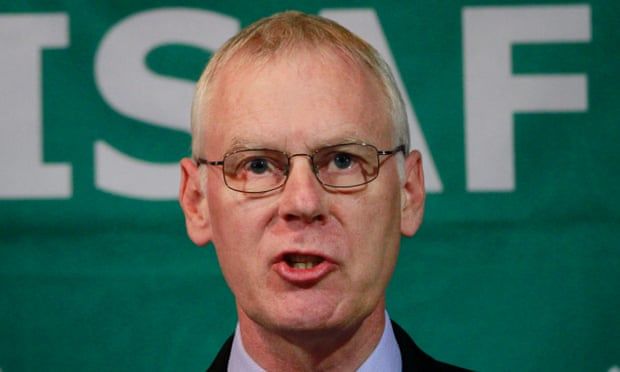Intelligence chief seeks assurances over Afghan helpers and that country will not become terrorist base
One of the UK’s most senior intelligence chiefs has held talks with Taliban leaders to negotiate safe passage out of Afghanistan for British nationals and Afghans who worked with UK forces, and to seek assurances that the country will not become a base for international terrorists.
Sir Simon Gass, the chair of the joint intelligence committee, travelled to Doha in Qatar a few days ago, where most of the Taliban’s exiled leadership is based, to talk to Afghanistan’s new rulers as UK, US and other western troops pulled out.
The discussions with the group that the UK and its allies spent 20 years fighting are part of a wider British and western effort to reach understandings with the Taliban that could eventually lead to diplomatic recognition.
 Sir Simon Gass, chair of the joint intelligence committee, has travelled to Doha in Qatar to talk to the Taliban.
Sir Simon Gass, chair of the joint intelligence committee, has travelled to Doha in Qatar to talk to the Taliban.
But there is an immediate emphasis in the back-channel discussions on trying to allow Afghans who want to come to the UK safe passage to neighbouring countries such as Pakistan, Uzbekistan and Tajikistan.
Thousands of Afghans listed as at-risk by the Foreign Office could not be picked up when the emergency airlift ended over the weekend. A further 1,000 Afghan interpreters and their family members are stuck in the country, with an entitlement to resettle in the UK.
Gass has been named by Boris Johnson as his special representative for Afghan transition, tasked with leading the potentially fraught negotiations, which come at a time when the UN has accused the Taliban of engaging in summary executions of former Afghan soldiers and others who worked with the ousted government.
A Downing Street spokesperson said: “The prime minister’s special representative, Simon Gass, has travelled to Doha and is meeting with senior Taliban representatives to underline the importance of safe passage out of Afghanistan for British nationals, and those Afghans who have worked with us over the past 20 years.”
The UK is desperate to avoid Afghanistan becoming a base for international terrorism, which according to British sources is one of the topics under discussion in the meetings. While the local Islamic State affiliate, ISKP, claimed responsibility for a terror attack that killed nearly 200 people at the airport on Thursday, the group is hostile to the Taliban and does not have the capability to strike abroad.
However, British security agencies are concerned that the Taliban could allow jihadist groups to set up training camps similar to those run by al-Qaida before September 11.
Back-channel conversations involving intelligence chiefs talking to former or even current enemies are nothing new. The CIA chief, William Burns, met the Taliban’s de facto leader Abdul Ghani Baradar over a week ago to discuss the final exit of the US from the country, at the end of the 20-year war.
The UK fought alongside the US in Afghanistan between 2001 and 2014. A total of 457 British personnel died in the conflict fighting Taliban soldiers, many in bitter fighting in the southern province of Helmand.
Britain’s foreign intelligence service MI6 has also been active during the crisis, with Pakistani media reporting that Sir Richard Moore, the agency’s head, met Pakistan’s chief of army staff, Gen Qamar Javed Bajwa, last week to discuss intelligence and defence collaboration after the withdrawal from Afghanistan.
Concerns among MPs remain high about the safety of people trapped there who have contacted people in the UK asking for help with resettlement. Earlier on Tuesday in a briefing for MPs the defence secretary, Ben Wallace, said that Afghans should “use their judgment” in deciding whether to flee to the border.















